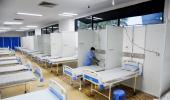The Union health ministry on Monday reviewed the steps for health screening of international travellers arriving in India at airports and ports after two cases of Monkeypox were reported in the country.

A 31-year-old man from Kannur in Kerala who returned from Dubai tested positive for Monkeypox on Monday making it the second confirmed case of the disease in India.
The Union health ministry last week rushed a high-level multi-disciplinary team to Kerala to assist the state health authorities in instituting public health measures after the first confirmed case of Monkeypox -- a 35-year-old who returned from the United Arab Emirates -- was detected in Kerala's Kollam district on Thursday.
Monday's meeting was attended by airport and port health officers (APHOs and PHOs) and regional directors from regional offices of health and family welfare.
They were advised to ensure strict health screening of all arriving international travellers which can minimise the risk of importation of Monkeypox cases into the country, a health ministry statement said.
They were advised and re-oriented in the clinical presentation of Monkeypox disease as per the ministry of health's 'Guidelines for Management of Monkeypox disease'.
They were also advised to coordinate with other stakeholder agencies like Immigration at international ports and airports to streamline health screening processes besides ensuring suitable linkages with hospital facilities earmarked to each port of entry for timely referral and isolation.
The meeting was attended by senior officials from International Health Division, and Disaster Management Cell.
According to the World Health Organisation (WHO), Monkeypox is a viral zoonosis (a virus transmitted to humans from animals) with symptoms similar to those seen in the past in smallpox patients, although it is clinically less severe.
Monkeypox typically presents with fever, rash and swollen lymph nodes and may lead to a range of medical complications.
It is usually a self-limited disease with symptoms lasting from 2 to 4 weeks.
In the 'Guidelines on Management of Monkeypox Disease' issued to states and UTs the Centre stated that human-to-human transmission occurs primarily through large respiratory droplets generally requiring prolonged close contact.
It can also be transmitted through direct contact with body fluids or lesion material, and indirect contact with lesion material, such as through contaminated clothing or linens of an infected person.
Animal-to-human transmission may occur by bite or scratch of infected animals like small mammals including rodents (rats, squirrels) and non-human primates (monkeys, apes) or through bush meat preparation.
The incubation period (interval from infection to onset of symptoms) of Monkeypox is usually from 6 to 13 days but can range from 5 to 21 days, the document stated.
The case fatality ratio of Monkeypox has historically ranged from 0 to 11 per cent in the general population and has been higher among young children. In recent times, the case fatality ratio has been around 3-6 per cent, the document stated.
The symptoms include lesions that usually begin within 1-3 days of fever onset, lasting for around 2-4 weeks and are often described as painful until the healing phase when they become itchy (in the crust stage).
A notable predilection for palm and soles is characteristic of Monkeypox, the guidelines stated.
According to the guidelines, contacts should be monitored at least daily for the onset of signs/symptoms for 21 days (as per case definition) from the last contact with a patient or their contaminated materials during the infectious period.










